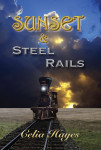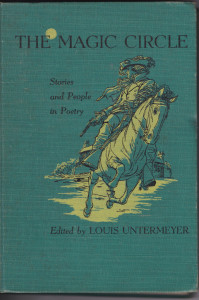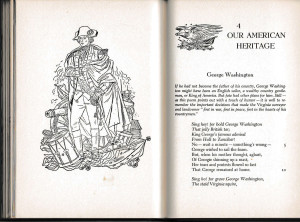So … even as I am starting research on the American Revolution-era novel, I am moved to start on another — about Minnie Templeton Vining, who was a peripheral character in Daughter of Texas, and in Sunset and Steel Rails.
A blue-stocking and a crusader, and … stuff. At mid-century, where there were a lot of things going on.
Enjoy. I don’t quite know where this will finish out … but Minnie is a ferocious abolitionist. And perhaps has other involvement in the Underground Railroad. It all depends…
Chapter 1 – A Lady of Leisure
A week after the reading of her father’s will, Minnie Templeton Vining sat in the old-fashioned parlor of her father’s tall house on Beacon Street with her sister-in-law Annabelle, while an errant spring breeze stirred the curtains … as well as the festoons of black crepe which adorned the façade of the Vining mansion. Narrow windows of the austere classical style that had been the height of architectural fashion early in the century now overlooked the broad avenue and leafy avenues and meadows of the Common and the public gardens beyond. The room within was furnished in the old manner; chairs, tables and shelves made in the austere style of two generations past, of polished wood sparingly ornamented, for the late Lycurgus Agrippa Vining resisted any change in the mansion in which he had ruled over as absolute dictator for half a century. The paintings and portraits, blue and white China trade porcelain, ranks of books in solid leather bindings, somber dark-red brocade upholstery, and very old-fashioned crewel-embroidered curtains – all testified at least as much to the wealth and pride of the family as to their magnificent disinclination to follow mere fashion … and thereby waste any portion of that wealth on transiently popular fripperies.
“So the house and a substantial income are yours to control absolutely!†Annabelle marveled, as she added sugar to the cup of tea which Minnie had poured from a silver pot which was one of the Vining’s treasured possessions, coming as it had from the workshop of the great Boston silver artisan, Paul Revere. In one of the account books in the old Judge’s study and library was preserved a bill made out in Revere’s own spidery handwriting, for that very teapot and a dozen silver spoons to be adorned with acorns and oak leaves.
“Indeed,†Minnie set down the teapot with a gentle clinking sound and took up her own refreshed cup. She was a confirmed spinster, being something somewhere in her fourth decade; a woman of decidedly firm opinions – and yet attractive to the eye for all of that, at least to those who entertained a taste for fine-boned features, and arresting blue-grey eyes, animated by a formidable and unsparing intelligence. “Cousin Peter is to be my trustee – but he is too sensible a man to attempt any thought of treating with me as if I were a silly child in need of correction and protection.â€
“I should say not!†Annabelle chuckled. “One might very well try to rope and ride one of those wild bison creatures of the plains. Your dear brother – my late husband – told me such a tale of the President of Texas shooting one of those dreadful beasts in the streets of the capitol of that benighted place!†The humor briefly departed from Annabelle’s pleasant countenance. She was a slender woman of about forty years, the same age as Minnie – and like Minnie, garbed in the darkest black of mourning for father and father-in-law. They had been friends since their earliest childhood, indulged by their parents, friends of the heart, as well as of marital and distant blood connections. And Annabelle was a Saltinstall connection, which counted for something in Boston.
“My brother had many tales to tell of his travels,†Minnie acknowledged, although she held deep in her heart the one which she would never distress Annabelle by telling – of that low-bred woman in farthest Texas, the one who had cohabitated with her youngest brother, and bred four nasty brats with him, or perhaps some other man, no matter what her brother claimed was a proper marriage in that benighted place. That was a deathbed secret and confession she would take to her own grave, rather than distress Annabelle with revealing it. Annabelle was his wife in the eyes of the law and of Boston. That woman in Texas was a nobody and of no character at all. Annabelle – dear, innocent Annabelle – deserved a measure of peace of mind, if not happiness, in the wake of a marriage-not-marriage to a husband who was never present in Boston but always gone on interminable ocean voyages and travels in a vain attempt to recover his health.
“Telling the absolute truth can often be a brutal cruelty,†her father, Judge Vining was wont to say. “Consider well the costs of relieving your own conscience, Minerva, if that cost comes at the expense of another’s peace of mind and happiness.â€
“He did, indeed,†Annabelle smiled, ruefully. Her husband – Minnie’s youngest brother – was dead some eight years past, in this very house. The consumption took him, painfully, on his final return. Minnie did not like to think of that even now, or the embarrassing situation which had brought him home for that one last time. “You were such an angel, Minnie – nursing him through those last awful days. Need I say again how grateful I was for that? It was all such a tangle – Sophia having just married, and in such difficulty with her first child. It was all that I could do to attend on my dearest little girl, night and day … I feared so much for her! Richard was a treasure in her travails, of course – but a husband is not so attentive as a mother – or a sister would be!â€
“It is what we do, my dear – for those whom we love,†Minnie replied, whereupon her sister-in-law sighed.
“So we do, Minnie,†and her expression brightened with genuine curiosity. “Now – that you are a spinster of independent means, and your dear father is enjoying his heavenly reward; what will you do with yourself, and this establishment?â€
Minnie set down her teacup and regarded the parlor; hers and hers alone, to do with as she thought fit. This was a heady feeling, and Minnie longed to stretch her wings and soar, soar on the pleasant updraft of a generous income and control over it, after two decades and more of being bound by obligation to family. Truth to tell, she had not minded all that very much. Papa-the-Judge (for so she always thought of him) may have been a magisterial and terrifying parent to his sons, employees, and those brought before him at the Bar, but his only daughter had always had an especially affectionate bond with her father. Her mother – dead in childbirth with her – had been the Judges’ second wife for a brief time.
“A clever woman,†Papa-the-Judge had often said, on those rare occasions when he had been moved to speak of such personal things. “Bold as brass, fearless – she was a spy in the late war, Minnie – did I tell you of that?â€
“Yes, you did, Papa – often,†Minnie had replied.
During his last days on this earth, Papa-the-Judge had often patted her hand, at the conclusion of maundering about in his reminiscences, and promised, “Well, then, Minnie – you are to be well-provided for, my girl, since you aren’t inclined to matrimony. I’ll have Peter as your advisor, but he’s a sensible man. Have seen too it, y’see. The only intelligent female child of my blood … the image of your mother. She was a spy, you know. Carried messages for Doctor Warren’s network, back in the day when the bloody Lobsterbacks. Bold as brass, although she was only a bit of a child when I first lay eyes on her … she would want to see you holding to your own independencyâ€
“I know, Papa,†Minnie would answer. She knew very well that she was the image of her mother. There was a small framed portrait painted on ivory in Papa-the-Judge’s monumental desk, secreted in one of the small drawers, which Minnie knew the secret to opening. When she was younger, she had often compared the painted features to her own, reflected in the small elaborate glass mirror which hung opposite the window in Papa-the-Judge’s study. And in any case – Cousin Peter, and others who had known her mother had often commented on the likeness.
No, she would not change the parlor, or Papa-the-Judge’s library, or even all that much about the house. All too dear and familiar, and now it was all to be hers, to order as she liked … but Minnie felt a restlessness in her. It was, she thought, like one of Annabelle’s songbirds, looking out from an elaborate silver cage, to which the door was open, wanting to spread her wings … yet wondering if she yet dared.
Yes. She did. Minnie sipped from her own teacup, and then set it down again with a tiny, decisive clink against the saucer.
“I have decided to go traveling,†she announced. “Oh, not terribly far, Annabelle – just as far as Charleston, and then for a stay in Richmond in Virginia. Cousin Peter has kin by marriage in Charleston. His daughter and her husband ministers – he is in orders, you know – to a very respectable parish in Richmond. They have written, extending their hospitality. I am of a mind to accept. Would you like to accompany me? I would welcome your companionship.â€
“For how long, do you plan to remain abroad from Boston?†Annabelle regarded Minnie with an anxious expression, and Minnie smiled in a manner calculated to reassure.
“Not terribly long – for the length of the summer, and return in time to celebrate Little Richie’s birthday, of course. It is …†and Minnie sighed. “My dear, I long to escape these walls for a time, and refresh my soul by gazing on new vistas. I beg you to accompany me, for the sake of respectability. And …†she shot her sister-in-law a severe glance. “It would be energizing for the both of us. We are both allowed a certain considerable degree of freedom by our status as widow and spinster? Why not explore, as far as we are allowed by the strictures of decent society? Why should we be kept mewed up in our little tiny parlors, like falcons wearing blinding hoods, when we might soar?â€
“Because …†Annabelle began, irresolutely, and Minnie couldn’t keep herself from snorting.
“Because, fiddlesticks. I have a purse and the inclination, and I want to do something other than sit in my parlor, see that the maids dust the furniture properly and take calls on my at-home day. There is a larger world and great causes to fight for, Annabelle – shouldn’t we begin claiming parts of it for our own, rather than just live as silly simpering angels in the house?†She fixed her sister-in-law with her most ferociously-determined expression, and – as Minnie had been certain that she would – Annabelle crumbled.
“Of course, I will accompany you,†her sister-in-law yielded with a sigh. “But … have you set a date for commencing this … this project of yours. And … I suppose I shall not require any winter things in my trunks…â€
“Next month, I think,†Minnie replied, in secret relief. “I shall have to see to the arrangements, and consult with Cousin Peter, of course. But oh!†she smiled and took Annabelle’s hand in her joyful embrace. “It will be such fun!â€




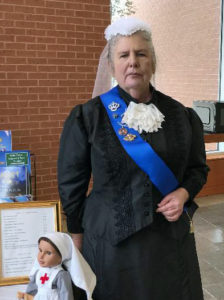



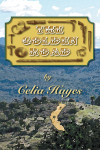
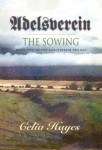
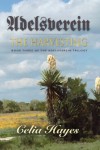
 rat with a desperate need to marry … marry anyone. The main narrative follows Isobel and her very young ladies’ maid, Jane Goodacre as they journey to Texas and begin building new lives for themselves. Alternate chapters deal with their experiences and perceptions as Isobel builds confidence in herself and trust in her husband, and Jane – against her own expectations – develops a sense of independence and falls in love. Magda and her daughter Lottie, Hansi and Liesel Richter appear as supporting characters, as do Peter Vining and his wife, Anna Richter. Hetty Moylan and Morag’s daughter Jemima-Mary also appear. Historic characters appearing include the gunman John Wesley Hardin, and Lizzie Johnson Williams, famous as a woman rancher of the period. The character of Wash Charpentier, champion cowboy, is based on Nate Love, an early rodeo champion – who retired from cowboying to become a Pullman porter. The narrative concludes in the late 1870s, although there is an afterward, set in 1918.
rat with a desperate need to marry … marry anyone. The main narrative follows Isobel and her very young ladies’ maid, Jane Goodacre as they journey to Texas and begin building new lives for themselves. Alternate chapters deal with their experiences and perceptions as Isobel builds confidence in herself and trust in her husband, and Jane – against her own expectations – develops a sense of independence and falls in love. Magda and her daughter Lottie, Hansi and Liesel Richter appear as supporting characters, as do Peter Vining and his wife, Anna Richter. Hetty Moylan and Morag’s daughter Jemima-Mary also appear. Historic characters appearing include the gunman John Wesley Hardin, and Lizzie Johnson Williams, famous as a woman rancher of the period. The character of Wash Charpentier, champion cowboy, is based on Nate Love, an early rodeo champion – who retired from cowboying to become a Pullman porter. The narrative concludes in the late 1870s, although there is an afterward, set in 1918.